Latest Articles
CSF Local Integrated Delivery- Another Local E-Commerce Game Changer

CSF Local Integrated Delivery- Another Local E-Commerce Game Changer
In another boost for Trinidad & Tobago E-Commerce, courier service king CSF Couriers, has put customers AND MERCHANTS first with their new CSF Connect API which allows for seamless integration between online stores and their CSF Domestic Delivery Service. Reliable domestic delivery has been a challenge for online stores in T&T, and now that online shopping is here— and here to stay, for the first time, merchants can focus totally on selling without the logistics headache which has been a perennial nightmare.
Well… it’s really the second time, CSF Couriers is not the first. A similar service has been around for years— from Universal Package Systems Limited. In fact, my first integration with them was in as far back as 2019 on a Magento site. However, their service never took hold with my clients, both back then, and even today amidst the pandemic when you would have expected that this would have been their time. Maybe being a well kept secret is their strategy, or their focus is elsewhere, who knows?
First Integration with CSF Connect API is Forward Multimedia’s
Forward Multimedia is pleased to announce the first and only (at the time of writing) integrated delivery for Woo Commerce online stores using CSF’s API. This first integration was developed and launched on my client’s site: Miva Import/Export (mivatt.com). Some features are specific to Miva per client’s own requirements, and we worked alongside CSF devs to tweak their API according to our needs.
How CSF Connect API works
Without getting into the technical aspects of API’s and how they work, (except that de ting wukkin), I’ll still impress you with a quick Google— an API is the acronym for Application Programming Interface which is a software intermediary that allows two applications to talk to each other.
The Forward Multimedia development team has been working feverishly this past few months designing our own custom plug-in to make this connection with a Woo Commerce online store. The nature of an API allows for connection to any platform that’s ‘open’ to it. In this case, the WordPress/Woo Commerce platform I use for most all online stores I design. It is ‘open source’, an industry term developers love to hear, and has always been, so no problem. I’ll get into other platforms later.
Below I’ll describe the main features of how our plug-in works, minus a few trade secrets. It’s important to note that CSF only provides the API, i.e. the connection to their system and nothing more; the programming and interface on the online store side required custom coding and development. Payment integration with First Atlantic Commerce (FAC) works the same way, Also important to note, is that because it requires custom development, you are pretty much free to design any feature at will within the limitations of the API.
And also, technically speaking, ours isn’t an official WordPress plug-in per se, I conveniently use it to refer to the extension of WordPress functionality that it similarly provides.
As the API is a connector between two applications, I’ll describe likewise.
1. It connects to your online store
Of course it does, without it it wouldn’t be API’ing would it? The connection comprises two (2) elements:
- The front end interface (what the customer sees)
- The back-end interface (what the merchant sees)
FRONT END: Trinidad & Tobago City & Town dropdown
On the customer side, the point of first contact is in the Billing/Shipping address area has our own city/town dropdown list to select your delivery area. This is so nice to see, our own town listing like international sites signaling that “online shopping, we is arrive!”… twenty years late, but doh study it!
It’s worth noting that there’s no obvious CSF interface, no reference or identification, it’s all in the background.
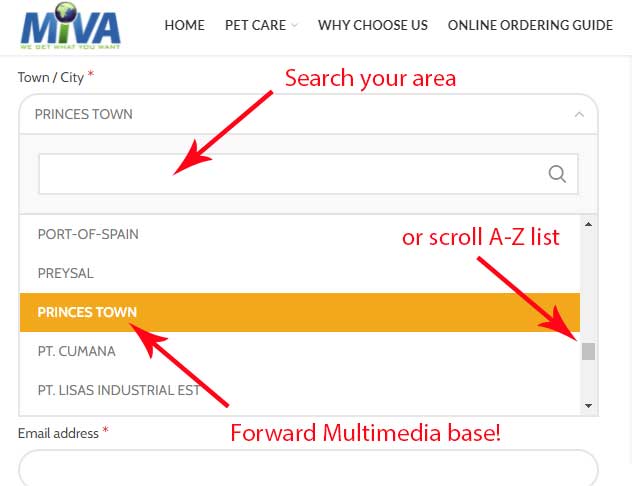

And more importantly, if you search or scroll down to the T’s, Toco and Tobago are there! Tobago has always been like a whole other country when comes to delivery, always leaving customers to inquire if you deliver to Tobago, or needed special mention in the delivery guide.
And to prove that CSF delivers to ANYWHERE in Trinidad & Tobago, check under the B’s!!!! CSF, take win!
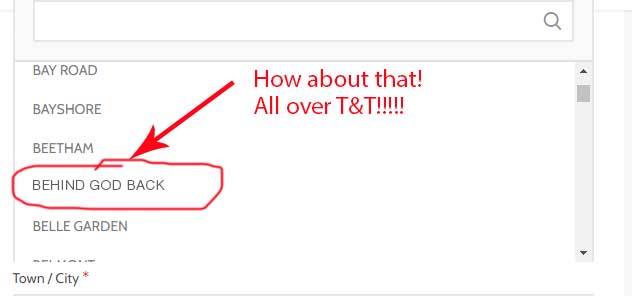
BACK END: Woo Commerce click to notify CSF for pick-up
On the merchant side, there are CSF interactive buttons with some important features, the main one being notifying CSF that you’ve picked and packed the order and that it’s ready for CSF to pick-up and deliver to your customer.
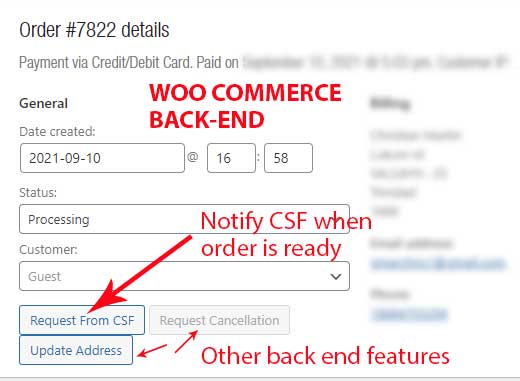
2. It connects to CSF
CSF is never aware that an order was placed on your site until you notify them via the button shown (that’s our button). Even though the merchant may have an account with CSF, there is no obligation to use the service for every order. This makes sense, as there will be cases where delivery might be better using a different method, say, TT Post if it’s a small item, or merchant may see it fit to use his own delivery vehicle. Cough, cough… did I just say TT Post is good for something…?
Woo Commerce doesn’t ‘fetch’ rates from CSF
The shipping fees charged by big guys like UPS, FedEx, DHL are based on two elements:
- The weight of the products in the Woo Commerce back-end
- The shipping company’s rate sheet for those weights by destination
On checkout, your actual product weights are used to ‘fetch’ the relevant shipping fee from the connected shipping provider. This is the fee the customer pays, which would generally be more than what the merchant pays the shipper.
CSF’s API does not work like that, the merchant who is free to charge whatever fee he wants, as long as it covers the fees CSF charges him for the service. It is the way Universal Package Systems Limited (UPSL) works though; when integrated, delivery rates are fetched from their system
Merchant sets own delivery rates
It’s important to note that while the product weights are not absolutely required to calculate the shipping fee for the customer in the front-end, they are required by CSF to properly charge the merchant in the back-end, as the maximum weight per order is 60 lbs. So merchants are free to use the shipping settings of the shopping cart, say, Flat Rate or Free Shipping, or Table Rates based on a variety of conditions, including physical product weights.
Automatic label generation for printing
When you click the button to notify CSF in the order back end, a label link is automatically generated for you to view, print, and affix to your package.
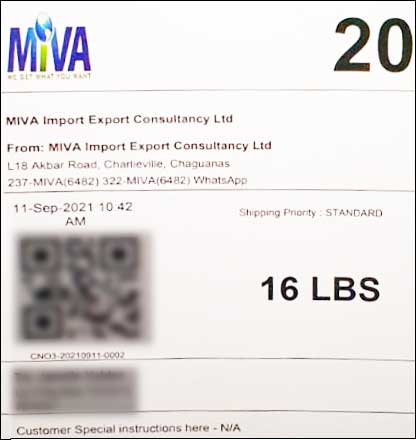
Customer alerts and notifications
Customers receive 2 automatic notifications straight to their email:
- The first when CSF stops by the merchant’s warehouse to pick up the package. Here the merchants hands over the package to the CSF driver and the driver scans the label.
- The second when the driver delivers and hands over the package to the customer and makes his final scan
You should be familiar with this scanning process from UPS, FedEx,, DHL, so you see we eh backward.
AUTOMATIC CUSTOMER NOTIFICATION: Tracking & Delivery
Other magic in the back-end
There are some other magic going on in the back end that I haven’t told or showed you. Well… I can tell you but then I’ll have to kill you. But given the pandemic and ongoing curfew it’ll be impossible to find you… unless I tell you and you promise to kill yourself :). That was a joke FBI, I repeat, a joke, nobody going to ded.
I’ll tell you just one, we have a built in algorithm, which smart packs the items in 60 pound packages. Now what does that mean? I can tell you but…
CSF Connect API Integrates with any open source platform
There are no limitations to platforms except that they be open source to access the code for development. However, integrating any platform for the first time will be very costly as you basically have to write the code from scratch like we did. If it’s a popular platform, then the cost will eventually go down. By ‘you’ writing the code, I’m referring to web designers who are reading this, and I know you are.
If you’re a merchant, you’ll have to purchase an integration as part of your online store package, as you can’t be expected to get a developer yourself, that’s what your web designer is for.
There might also be limitations, as some platforms provide some access to integrate First Atlantic Commerce (FAC) and none for delivery, like the Lightspeed POS, a popular POS being used by many stores in Trinidad & Tobago. Shopify might be iffy too, I haven’t looked into it yet.
API not absolutely necessary for CSF Domestic Delivery Service
CSF’s Domestic Delivery Service is not new, it’s been around for a while. However, even I never knew about it and look at the space I’m in. My knowledge of CSF was only their skybox service out of Miami which I have used. I have clients who use the service regularly though, (868.market for example), which is just to call them up and request pick-up when orders are ready. It’s only their API that’s new.
Use Forward Multimedia’s plug-in to integrate with your CSF account
Like I said, at the moment , Forward Multimedia has the only live integration with CSF’s API. Also at the moment, it’s working flawlessly but continuously being refined. After any initial release, the current version will be much better. That’s because the first release is always the beta— okay betas.. and betis?
I’m offering our plug-in to all clients of course. But even if you’re not a client and have a Woo Commerce store, I’ll be happy to provide the service, of course at a fee.
How to get CSF Domestic Delivery for your online store
You can apply for CSF Domestic Delivery and get access to CSF’s delivery fleet to deliver your package anywhere in Trinidad and Tobago at a low price. Registration is free and there are merchant packages as low as TT25.00.
This is very competitive, $25 TTD for delivery anywhere in T&T. They even collect payments on your behalf. See their website below for more info and to sign-up.
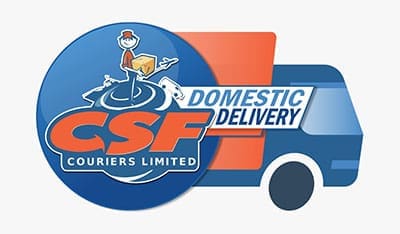
Conclusion
The CSF Connect API is right for you only if you want a first class, international standard online store where automated, seamless integration is part of the customer experience. It’s an opportunity for branding in my opinion, that the merchant is looking beyond providing a functional online store. Investment in such an integration shows that a merchant is serious about online shopping in T&T.
So it’s one small step for CSF and a giant leap for Trinidad & Tobago E-Commerce just when we needed it. This is what we need, the private sector stepping up and being innovative. CSF has more potential than other eventual competitors that will undoubtedly arrive, just because of their excellent track record of efficiency and stellar service.
And since I’ve also experienced the CSF delivery service first hand like so many others in T&T, and personally worked with them on this first integration, I’m confident they are truly best in the business, so I definitely recommend.

Interesting article.
I’ve been reading your content since 2019 (or 2020) about e-commerce after I created a PayPal that unfortunately had Regulations that prevented US Citizens from paying me. It seems like those problems still forever exist.
Will keep continuing to monitor the situation.
Also doing website work for clients and after extensive research it seemed like WiPay or FAC after all were the only options. The banks provide payments but use FAC behind the scenes. That leaves it up to WiPay, but you’d have to be a verified business to get that running. There’s still a hassle for the banks to confirm business accounts, and then Republic Bank (that seemed like the most tech savvy bank of the bunch) now has tons of issues with their new service and application.
It seems like I have yet a wait before something else becomes easily available, as I don’t believe that PayPal is coming back as easily as it had been, any time soon.
Cheers.
Correct, those PayPal problems exist by design, and will remain as long as the financial sector mafia/government collusion continues— which it will because they and we, like it so. Also correct, FAC and WiPay are the only options, but FAC is feasible for medium to large businesses; the lowest monthly fee at the moment is $75 USD.
Media darling WiPay, the lord’s gift to T&T FinTech, continues to be a chicken in an eagle’s clothing that will never fly. They’ve never gotten anything right except looking and smelling good in front of a camera and in the pages of the newspaper.
We won’t have to wait long before an alternative to WiPay becomes available, and it’s coming soon. I’m sure the little bird who told me was also overheard by WiPay, but there’s nothing they can do, they had their chance and blew it.